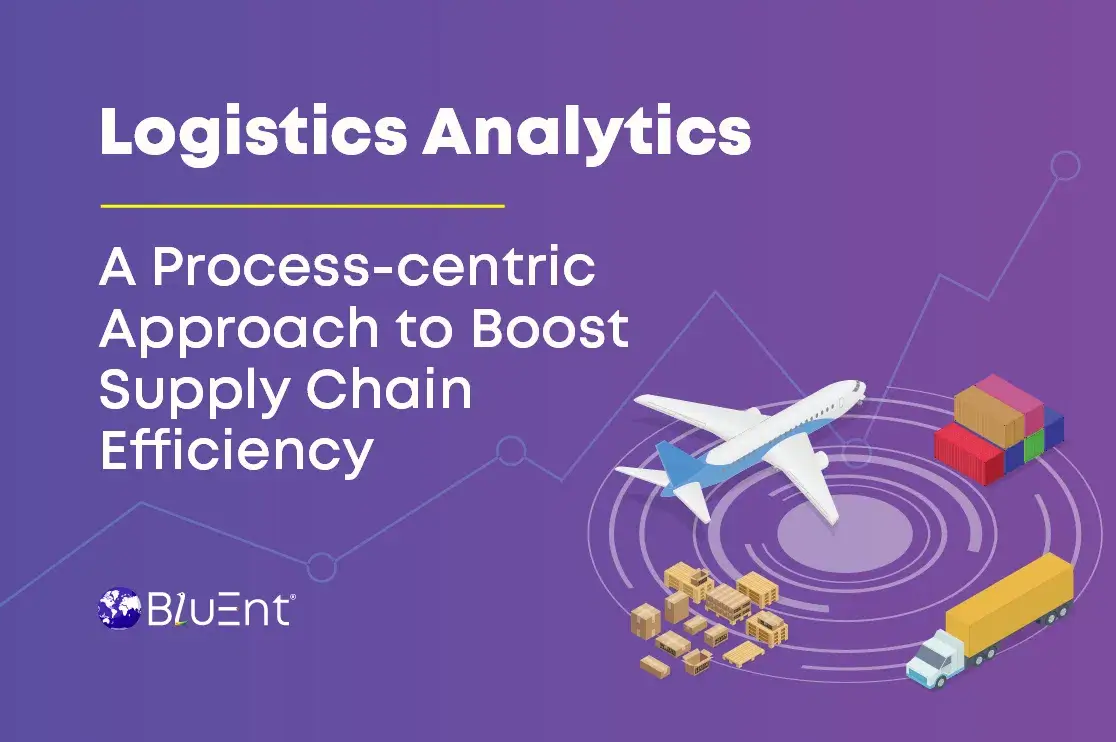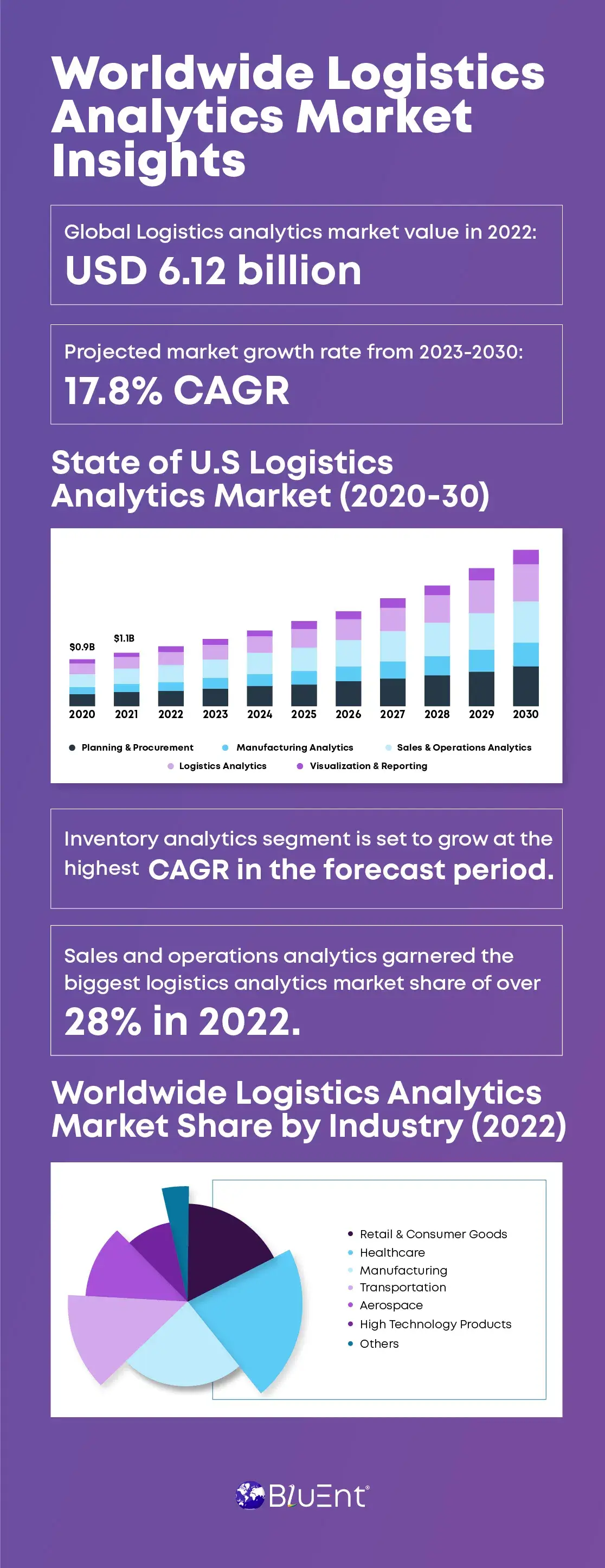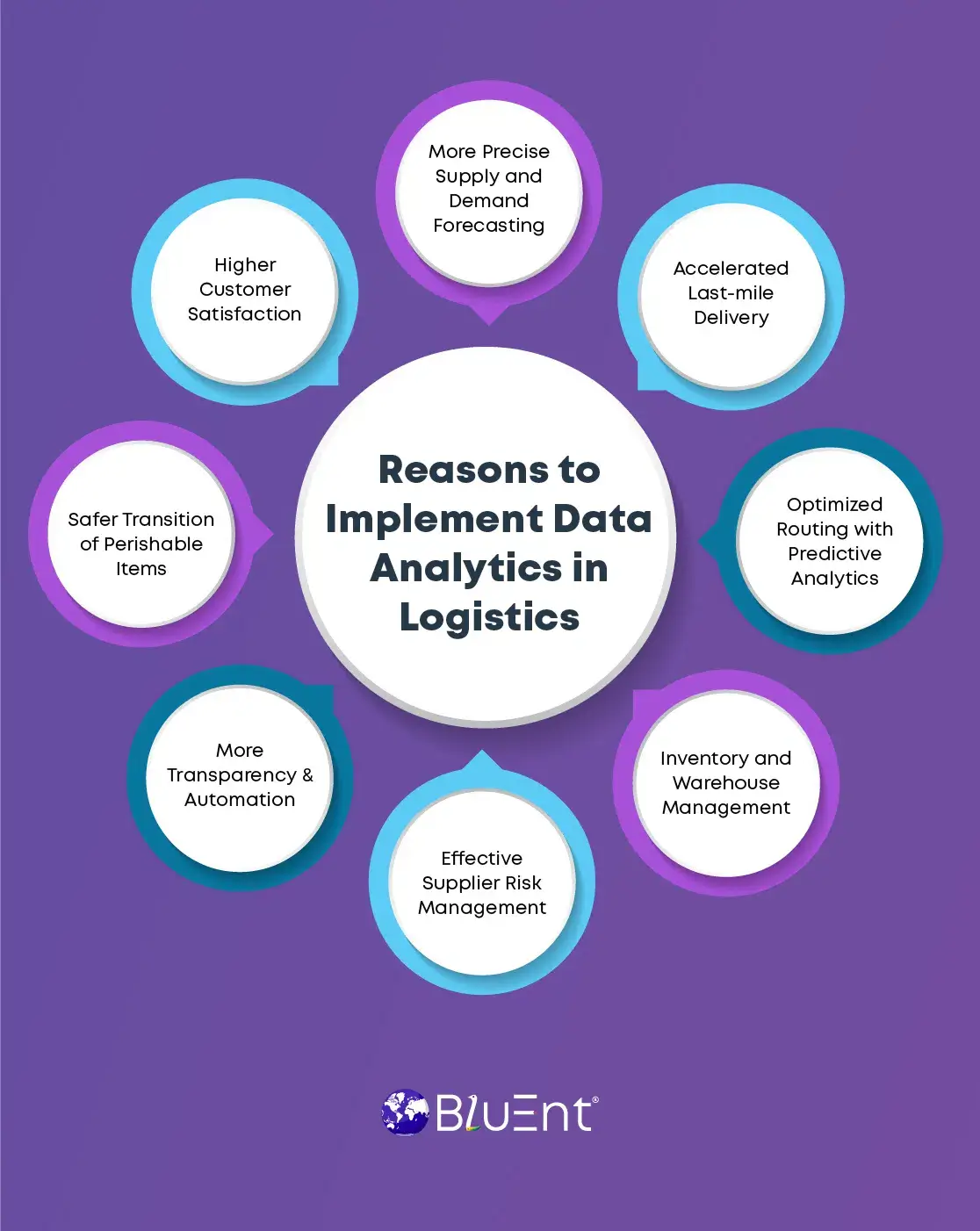The prevailing challenges of supply chain management have triggered the demand for logistics analytics.
Since the pandemic, many logistics brands turned towards big data analytics solutions to manage their operations for the market demands and changes. Noting that the global logistic sector faced significant issues with overstocking goods due to COVID-19 restrictions, the role of data analytics was sighted.
The constant disruptions in supply chain operations and management methods also contributed to the dominance of big data in logistics operations.
As per a report by GlobeNewsWire, the global supply chain analytics (SCA) market will reach USD 38.78 billion by 2032. That also conveys the importance of data analytics in logistics, involving numerous factors to favor the same.
If you’re new to logistics data analytics, navigate this blog section to discover more about its benefits for the supply chain.
Table of Contents:
What is Logistics Analytics?
The union of logistics and big data has transformed the way supply chains operate and manage shipments.
With the adoption of advanced business intelligence (BI) tools and robotic process automation (RPA) in the supply chain, the global logistics sector has eventually become a data-driven enterprise. Logistics companies are all set to hire certified data engineers to analyze their data for insightful gains.
No wonder logistics analytics is one of the critical supply chain risk management steps to take against these challenges:
-
Lags in internal supply chain operations, including production, demand, delivery, transport, and payments.
-
Operational issues emerge due to inefficient workforce or manual methods.
-
High transport costs due to peak pricing for last-minute supply demands.
-
Inadequate inventory resources, volume, real-time stock monitoring, and management needs.
-
Unorganized shipment and delivery of goods leads to delays and customer dissatisfaction.
-
Irregular system maintenance and support causing increased downtime and last-mile hassles.
-
Complexities in integrating, managing, securing, and analyzing data for logistics decisions and risk prevention.
Data analytics in logistics is a cornerstone of productive supply chain management. Companies use it to derive actionable insights to analyze further and forecast future trends. This helps them plan a risk-free logistics strategy and manage large datasets across multiple sources.
On one side, the future trends of big data analytics continue to transform diverse industries; both AI and predictive analytics in logistics and supply chains are gaining traction on the other side.
Take inspiration from our data analytics case studies to see how BluEnt is helping top brands and businesses.
Recommended Reading:
Role Of Data Analytics in the Logistics Industry
Now let’s outline some strong reasons to invest in logistics analytics software to optimize your supply chain:
More Precise Supply and Demand Forecasting
Logistics firms can use third-party data and integrated software to visualize changing patterns in real-time. That includes data visualization analytics to adapt to significant changes in the report quickly.
As a result, data science in logistics enables them to generate reliable demand forecasts for inventory planning.
Hence, logistics service providers use different types of data analysis to reduce wastage and delivery timelines. That empowers them to predict unforeseen challenges and take preventive measures ahead of time.
Accelerated Last-mile Delivery
The hurdles in last-mile delivery of goods during emergencies can increase shipment expenses by 28%. Any logistics company’s entire supply chain efficiency is affected by such scenarios.
Issues relating to last-mile shipment processes usually appear in urban cities, where market demands fluctuate in a minute.
However, the prime advantage of data science services in logistics is that they allow users to monitor entire shipment procedures during last-minute delivery. It further eliminates the risks of safety hazards or loss of shipped packages.
Optimized Routing with Predictive Analytics
The role of predictive analytics for risk management in logistics comes up for effective route optimization. It enables companies to tackle the on-route obstacles by using GPS, weather, traffic, road diversions, and other related data.
That eventually improves logistics operations in terms of travel timeline and fuel efficiency. As a result, shipment delivery teams identify the best route to reach the pickup or drop locations.
Inventory and Warehouse Management
Having ‘out-of-stock items in your product list will disappoint buyers. That is why most customers prefer buying from different brands when your products are unavailable.
Here comes the role of logistics sales data analytics for inventory management. With the help of data analysts, inventory managers can avoid unnecessary expenses for the storage facility, staff, and product expiration.
Similarly, logistics data contributes to warehouse management by inspecting the Stock Keeping Unit (SKU) and determining the span of shipment delivery. That prevents stockouts and overstocks of goods in the warehouses.
Effective Supplier Risk Management
Data analytics for predictive maintenance in field service can mitigate logistics supplier risks.
It extensively deals with localization in supply chain management strategy and prevents issues associated with the following:
-
Delayed shipments
-
Delivery of wrong products or at the incorrect address
-
Problems with product quality and quantity
-
Non-compliance with logistics rules and regulations
-
Inefficiency of suppliers’ shipment facilities
With logistics analytics, supply chains can manage and control risks with a selected supplier or collaborate with a new one.
More Transparency & Automation
The best benefits of data analytics in logistics and supply chain are greater reliability and process automation.
From transportation to real-time tracking and timely delivery, the entire process gets streamlined between the carriers, shippers, and customers—all thanks to advanced data engineering and logistics analytics.
Safer Transition of Perishable Items
Despite handling every shipment carefully, some selective packages carrying perishable items need extra attention. They may need robotic sensors for temperature to stay intact and in good condition for longer.
In such scenarios, logistics staff can extract data from sensors used with the storage facility of such shipments and operate them accordingly.
Higher Customer Satisfaction
Customer satisfaction depends on the speed of shipment delivery. Moreover, the quality of goods, safety, and packaging can also improve customers’ experiences.
Logistics brands use customer data analytics to get similar insights to improve their operations.
In today’s time, real-time tracking and shipment updates are the soul saviors of logistics and supply chain agencies. That keeps customers updated with every detail of the consignment, from the packaging to final delivery.
Transforming Logistic Data- How Can BluEnt Help you?
Data analytics is a crucial part of modern logistics and supply chain infrastructure. Companies rely immensely on big data to upscale their operational efficiency and stay ahead of the market competition.
Logistics analytics is the need of the hour for global supply chain networks. If you aim to optimize your logistics operations, BluEnt is a brand you can choose to get started.
At BluEnt, we’re mastering the pursuits of big data services, engineering, and visualization with over 20 years of industry experience. Our core competencies in business consulting also involve business intelligence, business process management, enterprise mobility, CRM solutions, and enterprise resource planning.
With a portfolio of 110+ clients from diverse industry domains, we’re catering to enterprises for more expansive areas of big data analytics, CAD engineering, and IT services.
Are you interested in data analytics services and solutions? Get in touch today.
Frequently Asked Questions
What are the challenges of logistics data analytics?
The logistics sector generates vast amounts of data that are challenging to handle manually. Here are the significant hardships of using data in logistics operations:
-
Integrating, managing, and securing logistics data stored across multiple sources or warehouses.
-
Handling too many variations in data quality dispersed across the supply chain database.
-
Inability to maintain a unified database system to collect, clean, and analyze data for performance tracking.
What are the essential features of data analytics in logistics?
The salient features of modern data analytics software for logistics are based on the following:
-
Streamlined logistics operations to prevent future risks.
-
Real-time interactions for better personalization.
-
Risk mitigation to secure customer and client data.
-
Even distribution of resources to ensure cost and operational efficiency.
















 Snowflake Cortex Agents: Scalable AI for Enterprise Data Insights
Snowflake Cortex Agents: Scalable AI for Enterprise Data Insights  Informatica ETL vs Informatica MDM: Which One Does Your Business Need?
Informatica ETL vs Informatica MDM: Which One Does Your Business Need?  Mastering Gift Card Data Management for Business Growth
Mastering Gift Card Data Management for Business Growth  Cloud Data Engineering: Infrastructure and the Road Ahead
Cloud Data Engineering: Infrastructure and the Road Ahead 
